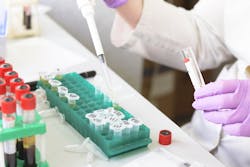NIH continues to boost national COVID-19 testing capacity
The National Institutes of Health (NIH) has announced $129.3 million in scale-up and manufacturing support for a new set of COVID-19 testing technologies as part of its Rapid Acceleration of Diagnostics (RADx) initiative, according to a press release. The NIH is awarding contracts to nine companies for technologies that include portable point-of-care (POC) tests for immediate results and high-throughput laboratories that can return results within 24 hours. These tests add to initial awards made to seven companies on July 31, 2020.
“Diagnostic testing is a critical component of the nation’s strategy to meet the challenge of the COVID-19 pandemic,” said NIH Director Francis S. Collins, MD, PhD. “Just started at the end of April, the RADx initiative has moved swiftly to speed innovation and later-stage development in the biomedical technology sector. The results thus far have been outstanding.”
In addition to NIH support, aspects of some of the testing technologies have been supported by the Biomedical Advanced Research and Development Authority (BARDA), also in the Department of Health and Human Services, and by the Defense Advanced Research Projects Agency (DARPA), in the Department of Defense.
The contracts support several novel technologies, some that use RT-PCR, a highly sensitive way to qualitatively detect nucleic acid from SARS-CoV-2. Included is a portable, battery-powered RT-PCR device that gives accurate results in 15 minutes, and a portable mini-lab with reagent flexibility that can perform RT-PCR assays in community hospitals and clinics in underserved, rural populations. Additional technologies include a lateral-flow immunoassay test strip that can be read without specialized equipment (similar to home pregnancy tests) and a sample concentrating method that significantly improves the sensitivity and performance of many different types of tests.
Five high-throughput laboratories will provide an expanded network of coverage for fast-turnaround laboratory tests in regions of national need. Each of these labs will manage the collection, analysis, and reporting of tens of thousands of tests per day at each site, significantly expanding national testing in September.
The NIH is developing and supporting this diverse group of tests to meet the needs of different communities. Factors such as speed, cost, accessibility and technical performance are key considerations for RADx support. These new technologies collectively will significantly increase the number, type and availability of tests by millions per week by this fall.

